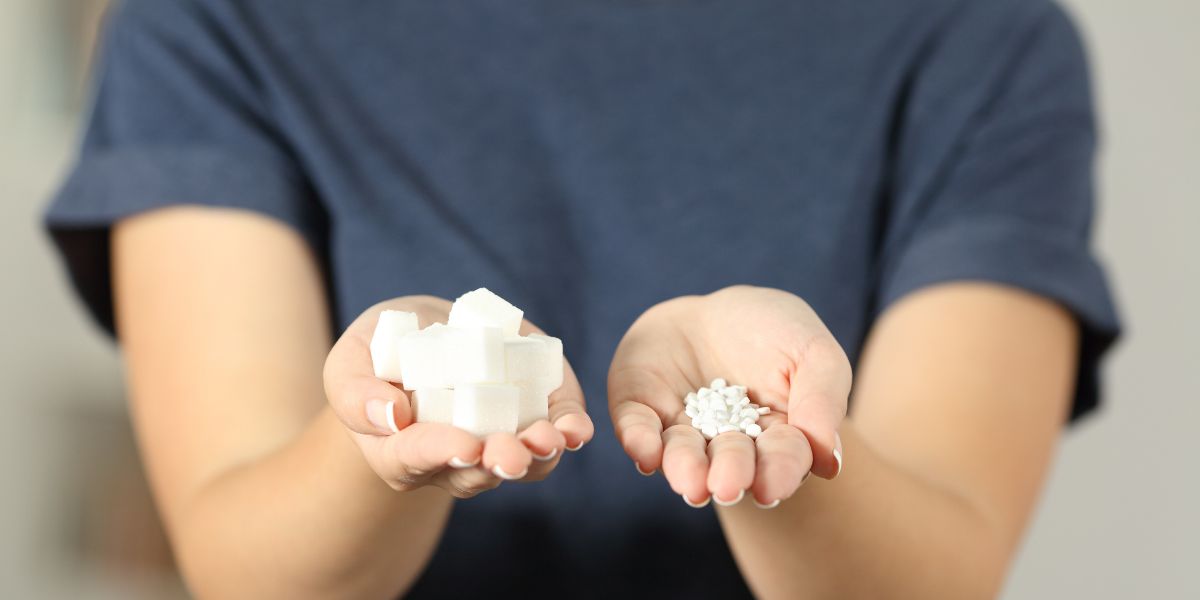Choosing which artificial sweetener to add to your diet can be difficult, as there are many different types available on the market.
Demand for artificial sweeteners has soared over the years as more and more people become aware of their benefits, which include reducing your calorie-intake from sugar and helping people with diabetes maintain normal blood sugar levels
Acesulfame-K
Acesulfame-K (the ‘K’ refers to the mineral potassium) is a commonly used tabletop sweetener that has 200 times the level of sweetness as sugar. It is also a common additive to confections and alcoholic drinks
Advantages
- Acesulfame-K does not affect blood-sugar levels
- No safety concerns regarding use
- It can be used in cooking and baking
- It is safe for use during pregnancy
Disadvantages
- Acesulfame-K can leave a bitter taste when used on its own.
- Animal studies have indicated higher use to be associated with greater risk of cancers. [100]
Aspartame
Aspartame is one of the most popular artificial sweeteners. It is derived from a combination of two amino acids: phenylalanine and aspartic acid, which are then combined with methanol to produce a substance that is 180-200 times sweeter than sugar.
Advantages
- While each gram of Aspartame contains 4 calories, it adds very little or no calories to foods and drinks as only a tiny amount is required to create the sweetness of sugar.
- Recommended daily intake of Aspartame (50 mg per kilogram of body weight) appears safe for pregnant women.
Disadvantages
- Aspartame can not be used for baking or cooking as it is not stable in heat or for long periods in liquid form.
- There have been reports of side effects, ranging from allergic skin reactions and respiratory problems to headaches and dizziness.
- Research on monkeys and rats indicate possible causation of seizures and brain tumours.
Mannitol and Sorbitol
Sorbitol and Mannitol are sugar alcohols found in plant foods such as fruits and berries, and are also commercially made for use as sweeteners. Whilst digested slowly, part of them isn’t absorbed at all, and as a result they can cause diarrhoea if consumed in large amounts.
Advantages
- About 60% as sweet as sucrose with much fewer calories
- Provide sweetness with a clea, cool pleasant taste
- Do not promote tooth decay
- Beneficial for people with diabetes – may be a useful alternative sweetener for diabetics
Disadvantages
- Consuming certain amounts of both these sugar alcohols (over 49 grams of sorbitol and more than 19 grams of mannitol) can cause some people to experience a laxative effect.
Saccharin
Saccharin is an organic molecule derived from petroleum. It is a very potent sweetener, containing roughly 300 times the amount of sweetness as sugar.
Advantages
- Due to its potency, only minute quantities are needed.
- Its sweetness isn’t affected by heat.
Disadvantages
- Animal studies indicate heavy usage saccharin to be associated with bladder cancer Human studies have yet to show a clear association but people in certain subgroups, such as heavy smoking males, may be at increased risk.
- Women are advised to use Saccharin carefully during pregnancy as the substance can cross the placenta.
Stevia
Derived from a plant in South American, Stevia is a calorie-free herb that is actually used as a pre-packaged replacement for sugar and artificial sweeteners. It is sold as a herbal powdered extract in most health food stores and is incredibly sweet, with the refined extracts of Stevia (steviosides) reported to have 200-300 times the amount of sweetness as sugar.
Advantages
- Stevia is an all-natural herbal product that has been used for centuries by native Indians in Paraguay.
- It has been thoroughly tested in dozens of tests around the world and found to be completely non-toxic.
- It can be a part of a healthy diet for anyone with diabetes since it does not raise blood sugar levels.
- Both Stevia and Stevioside extracts are extremely heat stable and can be used in cooking and baking.
Disadvantages
- Stevia does not caramelise as sugar does.
- Studies conducted by US researchers in the 1980s suggested that DNA changes occurred when stevia was tested with a certain bacteria. Certain health organisations are still not sure of its safety, with the US Food and Drug Administration defining it as an unapproved food additive when in whole leaf or crude-extract form on account of it having not been clinically tested in these forms.
Sucralose (Splenda)
Splenda contains the artificial sweetener Sucralose, which is 600 times sweeter than sugar, along with the bulk-adding maltodextrin. The latter enables Splenda to be used as a substitute for sugar in food recipes.
Advantages
- Sucralose is calorie-free, is not considered a carbohydrate by the body, and has no effect on blood sugar levels.
- It can be used as a baking ingredient, and doesn’t lose its sweetness with heat. In fact, Splenda is widely regarded as the best sweetener when it comes to baking and cooking.
Disadvantages
- The bulking agents used in Splenda can add around 12 calories per tablespoon of the mixture – calories which are usually not listed on the packaging.
- The use of Splenda can change the texture in baking recipes and can also add an ‘artificial’ taste when used as the only sweetener in the recipe.
- There are claims that preliminary animal based studies have linked the use of Splenda to organ damage.
- Studies in rats have found sucralose to be associated with reduced levels of beneficial bacteria within the gut. [99]
Articifial sweeteners in moderation
While artificial sweeteners are designed to help people satisfy their sweet tooth without adding the calories found in sugar, you must consumer them in moderation – just like everything else.
Also, switching to these sugar-free products should be just one part of your plan to start living healthy, and should be combined with a low-fat, nutritional diet and regular exercise , particularly if you suffer from diabetes.





